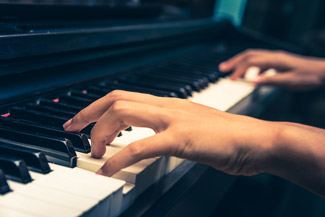Do jazz and classical pianists' brains work the same way?
 It may be an anachronism, but if Duke Ellington and Wolfgang Amadeus Mozart had to play the same piece of music, do you think their brains would show similar activity? According to a study published in NeuroImage, the brains of jazz pianists don't operate quite the same way as their classical counterparts. But why would a musician's brain activity change depending on the kind of music they play?
It may be an anachronism, but if Duke Ellington and Wolfgang Amadeus Mozart had to play the same piece of music, do you think their brains would show similar activity? According to a study published in NeuroImage, the brains of jazz pianists don't operate quite the same way as their classical counterparts. But why would a musician's brain activity change depending on the kind of music they play?Playing music requires highly developed brain structures with complex interactions between various abilities, and musical training induces sensorimotor plasticity. Previous research has already established that, for certain tasks, the brains of musicians work differently than those of non-musicians. But the present research carried out by scientists at the Max Planck Institute for Human Cognitive and Brain Sciences in Leipzig (Germany) goes even further. The abilities of musicians appear to be even more specific: they vary depending on whether you are a jazz or classical pianist.
To explain this phenomenon, the neuroscientists suggest that it may have something to do with the distinct requirements of these two musical styles: either perfectly interpreting the piece on a technical level (classical) or creatively improvising (jazz). Different procedures may be at work in the musicians’ brains as a result. To find out, the researchers recruited 30 professional pianists, half of whom specialized in jazz (for at least 2 years); the others had received classical training. All of the participants watched a hand playing a sequence of chords on a keyboard displayed on a screen. The sequence was dotted with errors in the harmony and fingering, and participants were asked to imitate the virtual hand and react accordingly to the irregularities. Their brain activity was recorded using EEG (electroencephalography) sensors.
The study showed a specific distinction between the two groups of musicians in how they planned their movements while playing the piano. In principle, regardless of the musical style, the pianist knows first what he has to play (which keys to press) and then figures out how to play them (which fingers he’ll use). It’s exactly this balance between these two planning phases that is influenced by the musical genre and the associated type of learning. The results really do demonstrate the processes that occur in the brains of classical and jazz pianists. In the first case, the pianist concentrates more on his playing (the second step or the "how"); what matters most is playing the piece perfectly on a technical level while adding some personal expression. In the second case, the pianist is more concerned about the “what” (first step) because he needs to be ready to improvise and adapt the notes played.
This experiment showed that classical pianists were better than the jazz pianists at following unusual fingerings (which they saw on the screen). The brain recordings showed more attention to the fingering, leading to fewer errors when imitating the sequence. As for the jazz pianists, when they were asked to play a harmonically unexpected chord in a standard chord progression, their brains began to re-plan the actions more quickly than the classical pianists in order to harmoniously continue the sequence.
The study thus provides neuronal proof of this flexibility in planning. These different planning-related brain activities observed in classical and jazz pianists explain the difficulty of moving from one musical style to another. Finally, according to Daniela Sammler, one of the study’s co-authors, this research shows “how precisely the brain adapts to the demands of our surrounding environment.”
Source: R. Bianco, G. Novembre, P.E. Keller, A. Villringer, D. Sammler. “Musical genre-dependent behavioural and EEG signatures of action planning. A comparison between classical and jazz pianists.”, in NeuroImage, April 2018







